Shutter door roll forming machines are commonly used in the manufacturing industry for producing metal sheets used in various applications, such as garage doors, industrial shutters, and commercial storefronts. While these machines are essential for the production of such products, their environmental impact cannot be ignored. With concerns growing over climate change and sustainability, it is important to evaluate the environmental impact of these machines and explore ways to reduce it. In this post, we will discuss the various environmental impacts of shutter door roll forming machines and explore measures that can be taken to minimize their impact on the environment.
Energy Efficiency of shutter door roll forming machines
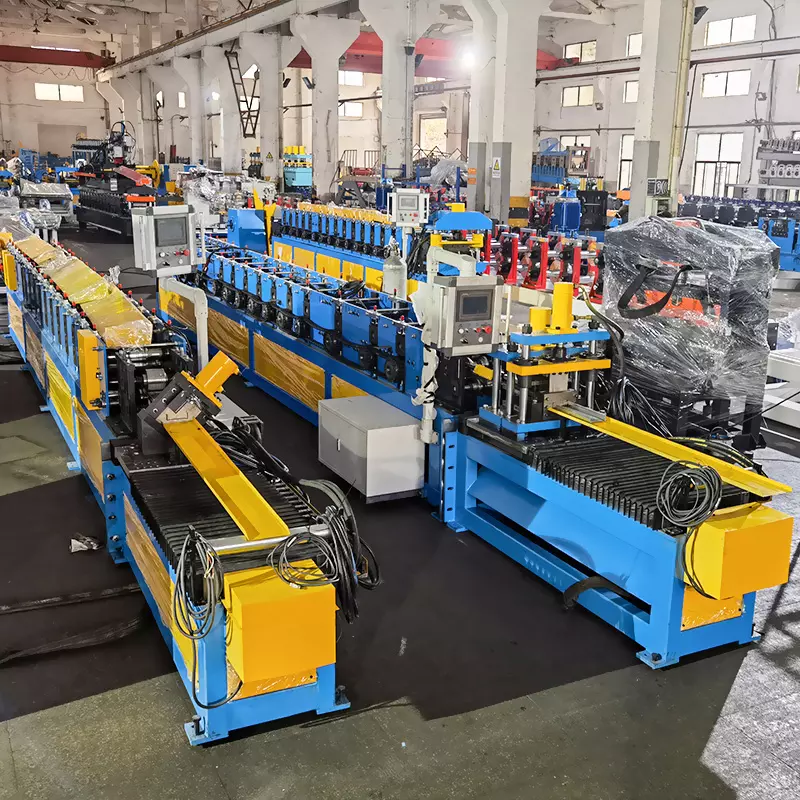
One of the most significant environmental impacts of shutter door roll forming machines is their energy consumption. These machines require a considerable amount of energy to operate, which contributes to greenhouse gas emissions and increases energy costs. However, with advances in technology, manufacturers are designing more energy-efficient models that can help reduce energy consumption and costs.
Modern shutter door roll forming machines incorporate features that improve energy efficiency, such as variable speed drives, intelligent control systems, and high-performance motors. These features allow the machines to adjust their speed and power consumption based on the required workload, reducing energy consumption during low-demand periods. In addition, some models utilize renewable energy sources such as solar power, reducing the reliance on grid electricity.
Investing in energy-efficient models not only reduces the environmental impact of shutter door roll forming machines, but it can also result in significant cost savings for manufacturers. Energy-efficient models can lower energy bills, reduce maintenance costs, and increase machine lifespan, leading to a more cost-effective and sustainable production process.
In conclusion, the energy efficiency of shutter door roll forming machines is an important factor to consider when evaluating their environmental impact. By investing in energy-efficient models, manufacturers can reduce energy consumption, lower costs, and minimize their impact on the environment.
Material Efficiency of shutter door roll forming machines
-
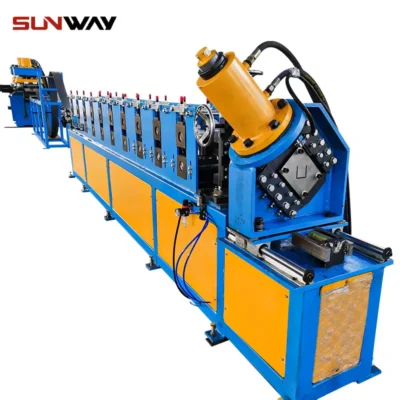 Electrical Cabinet Frame Roll Forming Machine
Electrical Cabinet Frame Roll Forming Machine -
 Din Rail Roll Forming Machine
Din Rail Roll Forming Machine -
 Cable Ladder Roll Forming Machine
Cable Ladder Roll Forming Machine -
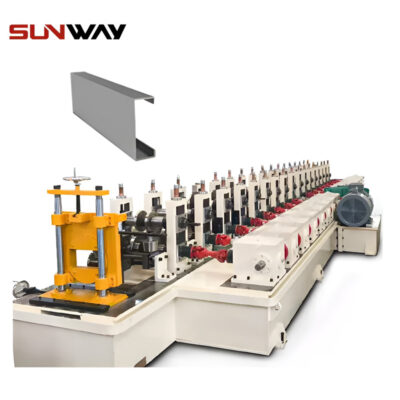 PV Mounting Bracket C Shape Profile Roll Forming Machine
PV Mounting Bracket C Shape Profile Roll Forming Machine -
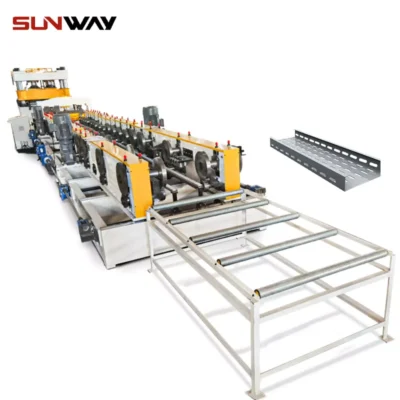 Cable Tray Roll Forming Machine
Cable Tray Roll Forming Machine -
 PV Mounting Bracket Roll Forming Machine (HAT / Omega Profile)
PV Mounting Bracket Roll Forming Machine (HAT / Omega Profile) -
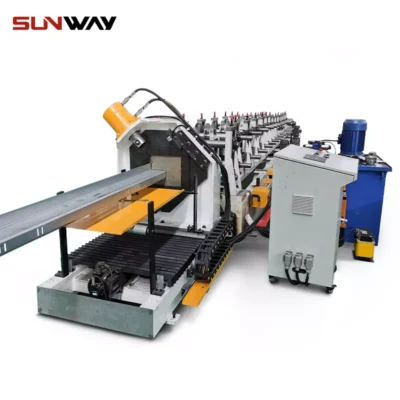 PV Mounting Bracket Z Shape Profile Roll Forming Machine
PV Mounting Bracket Z Shape Profile Roll Forming Machine -
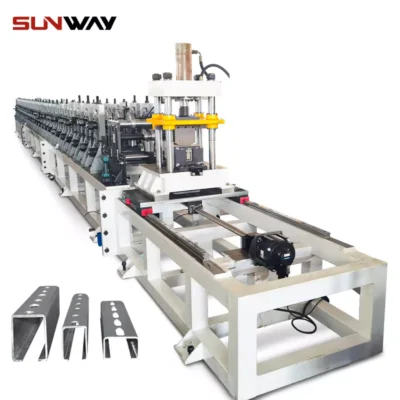 Solar mounting strut channel roll forming machine
Solar mounting strut channel roll forming machine -
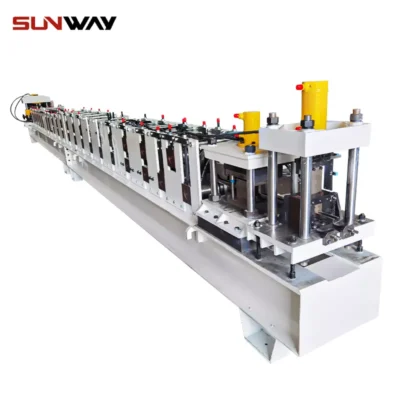 Strut Channel Roll Forming Machine
Strut Channel Roll Forming Machine
In addition to energy efficiency, modern roll forming machines are designed to optimize material usage and minimize waste, thereby reducing the environmental impact associated with material extraction, processing, and disposal.
One way in which modern roll forming machines achieve material efficiency is through advanced computer-aided design (CAD) and computer-aided manufacturing (CAM) software. These software programs enable manufacturers to design and manufacture highly precise components, reducing the amount of material required to achieve the desired dimensions and tolerances. Additionally, some modern roll forming machines feature advanced sensors and real-time monitoring systems that enable manufacturers to identify and correct any material waste or inefficiencies during production.
Another way in which modern roll forming machines optimize material usage is through the use of innovative material handling and storage systems. These systems allow manufacturers to store and transport materials in a manner that minimizes damage, reduces scrap, and ensures that materials are used in the correct order, reducing the likelihood of material waste and inefficiencies.
Finally, manufacturers can minimize material waste by incorporating recycling and reuse programs into their production processes. For example, some manufacturers may use recycled materials in the production of roll-formed components, reducing the need for new material extraction and processing. Others may implement scrap recycling programs, in which any leftover material is recycled and repurposed for use in other production processes.
Overall, the material efficiency of modern roll forming machines is an important factor in reducing their environmental impact. By optimizing material usage, minimizing waste, and incorporating recycling and reuse programs, manufacturers can reduce the amount of material that needs to be extracted and processed, resulting in a more sustainable and environmentally friendly production process.
Carbon Footprint of the shutter door roll forming machines
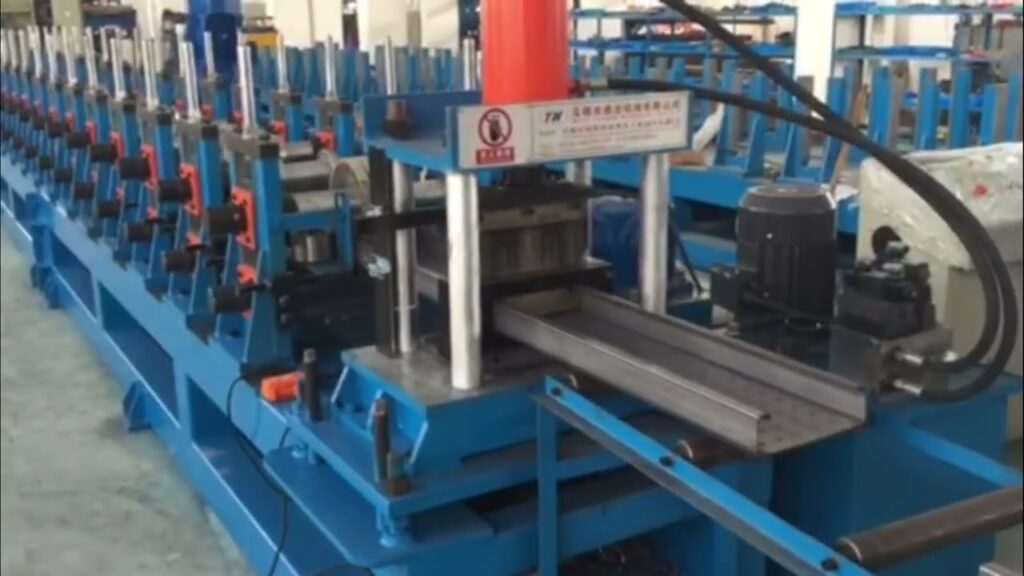
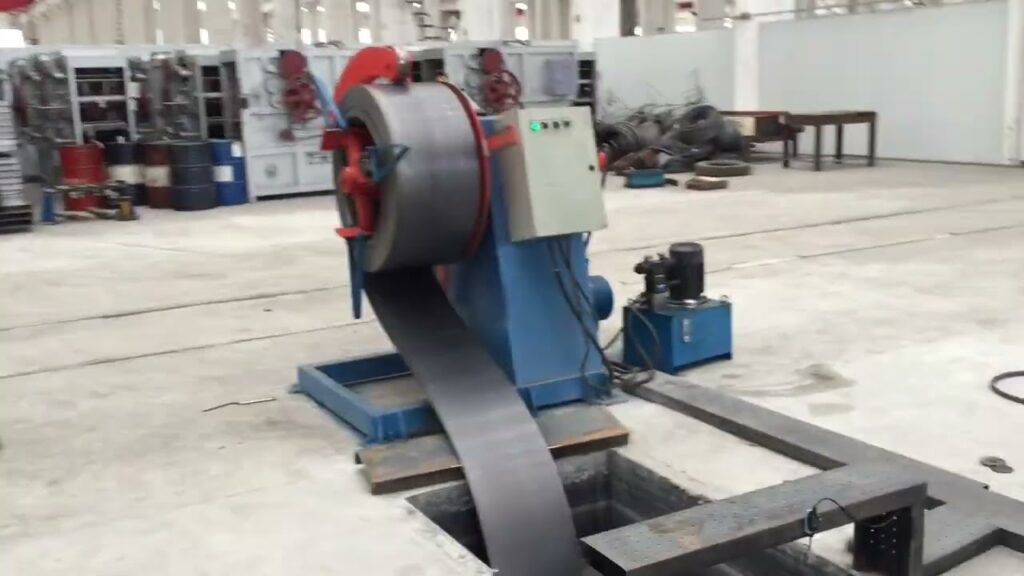
The carbon footprint of shutter door roll forming machines includes emissions produced during their production, transportation, and operation. These emissions contribute to the overall carbon footprint of the manufacturing industry, and it is essential to address them to reduce the environmental impact of these machines.
During the production of shutter door roll forming machines, emissions are produced through the use of energy-intensive processes, such as welding, machining, and painting. These emissions can be reduced by adopting sustainable manufacturing practices, such as using renewable energy sources, reducing waste, and implementing more efficient production processes.
Transportation is another significant contributor to the carbon footprint of shutter door roll forming machines. Shipping machines to customers or transporting materials to and from production facilities can result in significant emissions. Manufacturers can reduce transportation emissions by sourcing materials locally and utilizing more fuel-efficient transportation methods, such as rail or electric vehicles.
The operation of shutter door roll forming machines also generates emissions, primarily through the consumption of electricity. Manufacturers can reduce emissions by using renewable energy sources, such as solar or wind power, to power their machines. Additionally, manufacturers can invest in energy-efficient models that reduce the amount of electricity required to operate the machines.
Carbon offsetting programs are another way for manufacturers to reduce their carbon footprint. These programs allow manufacturers to offset their emissions by investing in carbon-reducing projects, such as reforestation or renewable energy projects. This approach can help manufacturers to reduce their environmental impact while supporting sustainability efforts elsewhere.
In conclusion, the carbon footprint of shutter door roll forming machines is a significant environmental impact that manufacturers must address. By adopting sustainable manufacturing practices, utilizing renewable energy sources, and investing in carbon offsetting programs, manufacturers can reduce their carbon footprint and contribute to a more sustainable future.
Waste Management of the shutter door roll forming machines
The production and operation of shutter door roll forming machines can generate various types of waste, including metal shavings, packaging materials, and chemical waste. Proper waste management is essential to minimize the environmental impact of these machines.
To reduce waste generation, manufacturers can implement lean manufacturing practices that optimize production processes and reduce the amount of waste generated during production. This approach involves identifying and eliminating any waste, such as excess material or inefficient processes, to reduce costs and environmental impact.
Another way to minimize waste is to reuse and recycle materials wherever possible. For example, metal shavings generated during the production process can be collected and recycled to produce new components. Packaging materials can also be reused or recycled to minimize waste. Manufacturers can also work with suppliers to reduce packaging waste by using more environmentally friendly packaging materials or implementing take-back programs.
Chemical waste generated during the operation of shutter door roll forming machines must be disposed of properly to avoid environmental contamination. Manufacturers must comply with relevant environmental regulations and ensure that any waste is disposed of through proper channels, such as hazardous waste disposal facilities. Manufacturers can also reduce chemical waste generation by using more eco-friendly lubricants and coolants in their machines.
Overall, waste management is an essential aspect of reducing the environmental impact of shutter door roll forming machines. By implementing lean manufacturing practices, reusing and recycling materials, and properly disposing of waste, manufacturers can minimize their environmental impact and contribute to a more sustainable future.
In conclusion, shutter door roll forming machines have a significant impact on the environment due to their energy consumption, material usage, carbon footprint, and waste generation. However, manufacturers can take steps to reduce this impact by investing in energy-efficient and material-efficient models, utilizing renewable energy sources, adopting sustainable manufacturing practices, and implementing proper waste management. By doing so, manufacturers can minimize their environmental impact while still producing high-quality products. As the manufacturing industry continues to focus on sustainability, it is essential that companies make efforts to reduce their impact on the environment.
